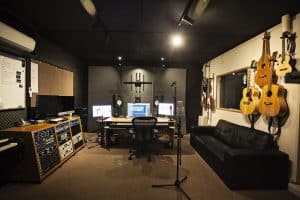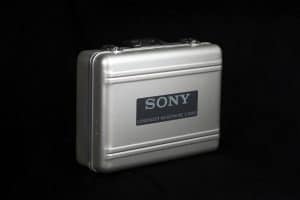An Introduction to Voice Over work
Voice over work is extremely competitive. The recorded spoken word is all around us in the media that we consume. It is so ubiquitous in fact that we, as consumers of audio, take it for granted. As a result, getting a job as a voice over artist is challenging. Candidates mistakenly think that because they can speak they can also easily get into the industry and be good at it. It’s not that easy! In this article we are going to look at what it takes to be good at voice over work and how to get into the business.
Our studio, Crash Symphony Productions, has been recording the voice since 2006. We are uniquely located close to Australia’s two largest CBD’s: Sydney City and North Sydney. As a result recording the spoken word has become our thing! We are going to examine all the important boxes that need to be ticked in order to be successful in this competitive industry. Read on to learn more about how you can get into the voice over industry!
The Voice Over Showreel
The showreel is the most important element needed to get this kind of work. Investing in a good showreel is about 70% of what is required to get the work in the first place. Don’t try doing it yourself at home. It simply doesn’t work. Most clients will only listen to the first ten to twenty seconds of a voice over demo before either moving on to the next.
We always suggest that candidates start their voice over demo with a greeting. Introduce yourself and tell the potential client something about your voice. Make it super brief and then move on to the main produced content. Don’t put any music behind the introduction. Make it honest and clear. They need the opportunity to hear your true voice before getting into the meat of your showreel.
Fine Tuning the Demo
Once you move into the main body of the your showreel choose some ads that vary in style and genre. Business, TV commercials, phone greetings, radio announcements, and general acting scripts are all good examples of the mix that is required on a successful demo. If all the short components are the same you will be limiting your job opportunities. You should demonstrate that you are diverse and capable. Don’t make the mistake of making each element long. Each should be extremely short and they should cross-fade into each other. Maintaining the attention of the listener is the ultimate goal and very hard to do.
Most voice over showreels are a maximum of three minutes. Most clients will not listen to the entire demo so make sure that the best parts are at the beginning of the demo and not at the end. Using a professional studio, like Crash Symphony Productions, to create your demo will make a huge difference to your chances of success.
The quality of the demo is impacted by the recording facility. We are able to record your voice in a very quiet space where there are no intrusive noises that get on to the recording. Our microphones and recording equipment are extremely high-end. This means the audio quality is very good and your vocal will sound its absolute best on the showreel. Our engineers are also very experienced at recording scripts. We can guide you through the process by making sure that you get the best performance for each part of the demo.
The Tone of Your Voice
There’s no question about it – Some people just have the voice. There’s a natural tonal quality that comes with the anatomical geometry of every individual. Some voices just sound amazing. It may be a male with a deep and rich vocal tone or a female with a sweet and sexy tone. There’s no doubting that the natural tonal quality of your voice is going to make a difference to your chances of success. However, this is not as much of a major factor as people may initially anticipate. Other factors play a much more important role in the success of the talent. Read on to learn more!
The Clarity of Your Voice
Clarity of voice is something that needs to be worked on. We refer to this as diction. Making sure that all the t’s and s’s are pronounced properly is really important and very much a learned skill. People who have done extensive training in acting are usually very good at increasing the clarity of their voice through these trained skills.
There’s no doubt that the recording equipment has a significant impact on the clarity of the voice on a recording. It isn’t just the talent’s skill. A condenser microphone in a very quiet, acoustically inactive, and sonically impermeable space is the ideal place to record a voice over. The microphone’s proximity to the voice is critical to getting the clarity right, too. If the mouth is too close to the microphone the bass frequencies will be loud and this makes the voice sound muddy. Conversely, if it is too far away the detail will be lost, also. If the microphone is too low with respect to the oral cavity the harsh sibilant frequencies will be loud and shrill. All these audio engineering factors play a major role in the perceived clarity of the voice on the recording.
Understanding Vocal Inflections
Vocal inflections are an important part of creating tense in a voice over recording. An inflection is an upward or downward movement in the pitch of the voice during the reading of a passage. Upward inflections are an indicating to the listen that the passage or idea will continue. That it is NOT the end of the idea. Conversely, a downward inflection indicates the end of a passage. It is a kind of auditory full stop to the listener. Once a talent is aware of the importance of inflections it is easy to do. It is amazing how few people are aware of inflections. They are really important for creating a good voice over recording.
The overall dynamic and contour of the voice over passage is super important in retaining the attention of the listener and ultimately in selling the idea. Without vocal inflections in the appropriate places the read can sound very monotonous.
Reading Tempo
Tempo, or read-speed, is another aspect of voice over recording that gets easily over looked by the talent. Many inexperienced voice over artists will tend to read very fast. They get nervous when they begin to record and, as a result, begin to race through the script. This is not good for the listener as it makes it hard for them to understand the message. An experienced voice talent will be able to adjust their reading tempo to what is required for the script. Maintaining the tempo is also critically important. When the producer asks the talent to slow the tempo down some inexperienced artists will slow down initially only to accelerate back up to their initial hyped tempo. Being flexible and controlled with the tempo is the sign of a strong voice over artist.
Reading Skills during a voice over
Reading skill is arguably the make or break of a good voice over artist. Truly professional voice over artists can walk into a studio, be handed a script that they have never seen before, and read it so fluently that you would think that they were saying it naturally off-the-cuff. This is akin to a violinist who can sight-read sheet music in an orchestra. Of course, it is not common for a talent to be thrown into such a situation but many times the script can be changed during the recording session. The strength of the artist’s sight-reading skills is a telling sign of who is a true professional and who is not.
Getting on a Voice Over Site
Now that you have your voice over showreel recorded and have honed the craft of being the talent the final step is to get the demo on a site. There are three most common sites that a prospective client might find their voice. A voice agency’s website, a studio website, or if the talent has their own webpage. Let’s examine each of these in some more detail.
Voice Agencies
Voice agencies are by far the most common places that a prospective client will find their talent. The agents will be able to liaise with the client and fast-track their search by communicating with them and identifying what specifically they need. These companies are usually very well established and have great visibility on search engines like Google. As a result a lot of traffic is captured and directed to the agencies. Getting signed to an agent is great but difficult. You need to have an incredible demo, be a proven performer, and it means you can’t have your demo on any other sites. It also means that a large chunk of the earnings will go to pay the agent.
Studio Webpages
Studios have taken to creating pages where they show off some of the freelance artists that they work with and think are good. The main benefit of this is that if a client contacts the studio first regarding a project the task of locking in the talent is hastened. These artists are freelance and are not signed to another agent. They also have more flexibility with the payment in dealing directly with the talent rather than the agent.This has certainly proven much more practical for CSP.
Talent Pages
Highly ambitious and organised artists will completely manage their own dealings and their website is central to getting new clients. They will need to compete with the SEO power of large talent agencies. If they succeed the financial rewards are enormous.
Reliability for Appointments and Return Business
Being a reliable business operator is the final point to having a successful career in the voice over industry. Some of the points listed here are so obvious but not everyone follows them. These are things like turning up to scheduled appointments on time and making sure that scripts are well rehearsed before the session.
Conclusion
As you can see there are some very specific boxes that need to be ticked in order to have a successful career as a voice over artist. Some of these points are within the control of the talent like reliability, getting a good demo made, and having visibility on the search engines. Other factors are more difficult to acquire like the skills that professional actors spend years training for and a natural tone.
Hopefully this article will help aspiring voice over artists get there careers off the ground. For further questions please feel welcome to contact us here at info@crashsymphony.com.au. Alternatively, give us a call on 0408 300 402. Best of luck!





